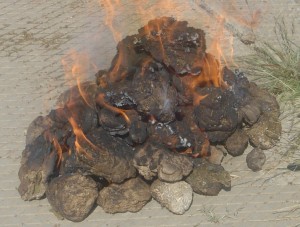From the Psalter:
They asked, and quails appeared, and he satisfied them with bread from heaven.
(From the Daily Office Lectionary – Psalm 105:40 (BCP Version) – May 16, 2013.)
 Once again I find this serendipitous connection between one verse in the Daily Office psalm and a news item in the daily papers. Psalm 105 is divided into two parts and our lectionary bids us read the first at Morning Prayer and the second at Evening Prayer. The psalm describes the Hebrews sojourn in Egypt. Part One (vv. 1-22) describes the captivity of Joseph and his later elevation to leadership in the pharaoh’s court, which occasioned the children of Israel taking refuge in “the land of Ham” where they were subsequently enslaved. Part Two (vv. 23-45) tells the story of Moses, the Exodus, and the Hebrews coming into the Promised Land.
Once again I find this serendipitous connection between one verse in the Daily Office psalm and a news item in the daily papers. Psalm 105 is divided into two parts and our lectionary bids us read the first at Morning Prayer and the second at Evening Prayer. The psalm describes the Hebrews sojourn in Egypt. Part One (vv. 1-22) describes the captivity of Joseph and his later elevation to leadership in the pharaoh’s court, which occasioned the children of Israel taking refuge in “the land of Ham” where they were subsequently enslaved. Part Two (vv. 23-45) tells the story of Moses, the Exodus, and the Hebrews coming into the Promised Land.
So hunger and famine, deprivation and want surface as themes both as a cause of the Israelites residence and ensuing slavery in Egypt, and as a consequence of their journey through the Sinai desert escaping from that servitude. The quoted verse celebrates God’s provision of food during their desert trek.
In today’s Los Angeles Times there is an article which begins with this question, “What happens to the 40% of food produced but never eaten in the U.S. each year, the mounds of perfect fruit passed over by grocery store shoppers, the tons of meat and milk left to expire?”
Twice a month about 100 families line up in the parking lot and hallways of my church to receive a few bags of food. As a distribution point for the local food bank system, our pantry operation offers canned goods, fresh vegetables, meats, bread, and other staples, as well as such things as paper towels, toilet paper, and personal hygiene products, to those unable to afford them in the stores. On the last Saturday of each month we see our biggest crowds as the month’s Social Security, WIC, food stamps, and other assistance funds have diminished.
In light of that monthly experience, I read the L.A. Times’ opening question and all I can do is shake my head in wonder! 40% of food produced in this country is never eaten? And yet there are these hundreds of people lining up for a food hand-out in my church . . . and that scene is repeated across the country in countless venues, and on an almost daily basis. Something is wrong! Something is broken!
The partial answer to the Times’ question is that some of it goes into the production of electrical power. The article is about the Kroger grocery company (through its Ralph’s and Food4Less divisions) composting the “garbage” food and producing methane gas to power generators. While I applaud this environmentally sound disposal solution, I can’t help but wonder, “Wouldn’t it be better if the food didn’t go to waste? Wouldn’t it be better if, instead of allowing the food to become inedible, it was distributed to those who are hungry?”
In the story of the Exodus, the food provided by God – the quail and the manna – could not spoil because it could not be kept. It was to be gathered and eaten; whatever wasn’t eaten simply didn’t hang around – the quail flew off – the manna evaporated. So neither the psalm nor the longer story in Exodus provide guidance for what to do with leftovers. Common sense, I think, has to fill that in. And common sense, I think, suggests that instead of letting food go bad and become fodder for a methane generator, it ought to be used to feed the hungry. I also think that that would be more attuned to the Gospel imperative.
Turning old food into electricity is at least a sounder decision than that reported a few months ago in Augusta, Georgia, where the inventory of a bankrupt supermarket was simply thrown away – in the presence of hungry people hoping for a handout! The needy poor, according to an article in the Augusta Chronicle, stood in the parking lot and “watched marshals stand guard as food was tossed into the trash” and hauled away to the city dump. “Some people even followed the truck to the landfill and were still turned away,” GreenLeft reported.
God provided food for the people. God satisfied them with quail and bread. God still provides food for the people. How we use it or misuse it is up to us. We don’t seem to be doing a very good job. Something is wrong! Something is broken!
====================
A request to my readers: I’m trying to build the readership of this blog and I’d very much appreciate your help in doing so. If you find something here that is of value, please share it with others. If you are on Facebook, “like” the posts on your page so others can see them. If you are following me on Twitter, please “retweet” the notices of these meditations. If you have a blog of your own, please include mine in your links (a favor I will gladly reciprocate). Many thanks!
====================
Father Funston is the rector of St. Paul’s Episcopal Church, Medina, Ohio.
 Today’s Old Testament reading is a disturbing piece in which the Prophet Ezekiel is instructed to lie down for several days (in fact, for more than a year) as a sign of the number of years Israel and then Judah will be punished.
Today’s Old Testament reading is a disturbing piece in which the Prophet Ezekiel is instructed to lie down for several days (in fact, for more than a year) as a sign of the number of years Israel and then Judah will be punished.  So let’s admit right off the bat that we have a problem here. Where the progressives and liberals among us would much prefer to read Paul condemning the institution of slavery, he does not. Instead, he simply admonishes slaves to be good slaves and masters to be good masters, and even goes so far as to analogize a Christian’s relationship with God (or Jesus) to slavery. This just doesn’t sit well in the modern mind and provides plenty of ammunition for those whom Friedrich Schleiermacher addressed as religion’s “cultured despisers.” We would much rather Paul hadn’t said this.
So let’s admit right off the bat that we have a problem here. Where the progressives and liberals among us would much prefer to read Paul condemning the institution of slavery, he does not. Instead, he simply admonishes slaves to be good slaves and masters to be good masters, and even goes so far as to analogize a Christian’s relationship with God (or Jesus) to slavery. This just doesn’t sit well in the modern mind and provides plenty of ammunition for those whom Friedrich Schleiermacher addressed as religion’s “cultured despisers.” We would much rather Paul hadn’t said this.
 It shouldn’t, but it always surprises me when I preside at a worship service and the offering of alms (cash money) is small. This is especially so at a small-attendance service when there are only a few people but even fewer dollars in the plate. It surprises me, I suppose, because of something I was taught by my grandfather. It shouldn’t surprise me, I suppose, because of the realities of which I am aware.
It shouldn’t, but it always surprises me when I preside at a worship service and the offering of alms (cash money) is small. This is especially so at a small-attendance service when there are only a few people but even fewer dollars in the plate. It surprises me, I suppose, because of something I was taught by my grandfather. It shouldn’t surprise me, I suppose, because of the realities of which I am aware. It’s a puzzlement!
It’s a puzzlement!  We are living through a presidential election campaign in the United States. It seems to have been going on for ever, and the political ads and the news coverage of the candidates are increasing in intensity and in frequency. Pollsters take the public’s political pulse; commentators analyze the polls; the public reacts to the analysis; the pollsters re-poll the public. It’s a system of pendulum swings that feeds upon itself and oscillates back and forth. Flip-flopping candidates are matched by a flip-flopping electorate, and the candidates, their surrogates, and the commentators all decry the fickleness of the crowd.
We are living through a presidential election campaign in the United States. It seems to have been going on for ever, and the political ads and the news coverage of the candidates are increasing in intensity and in frequency. Pollsters take the public’s political pulse; commentators analyze the polls; the public reacts to the analysis; the pollsters re-poll the public. It’s a system of pendulum swings that feeds upon itself and oscillates back and forth. Flip-flopping candidates are matched by a flip-flopping electorate, and the candidates, their surrogates, and the commentators all decry the fickleness of the crowd. This short passage from the Book of Acts describes the sort of world Jesus intended. Not just the sort of church . . . . the sort of world, the sort of human society, a complete community in which no one claims private ownership (it’s all God’s remember) and where there are no needy persons because what is needed is distributed equitably.
This short passage from the Book of Acts describes the sort of world Jesus intended. Not just the sort of church . . . . the sort of world, the sort of human society, a complete community in which no one claims private ownership (it’s all God’s remember) and where there are no needy persons because what is needed is distributed equitably. These are the words spoken by the great crowd of Jews and others who thronged the streets of Jerusalem for the Festival of Shavu’ot when the Twelve, empowered by the Holy Spirit, begin to tell the story of Jesus in languages they had never before spoken. Shavu’ot is a celebration with both agricultural and historical significance in Judaism. It is known as the “festival of the first fruits,” a harvest feast when the first fruits were brought as offerings to the Temple; it is also known as the “festival of the giving of the Law,” a celebration of the handing down of Torah on Mt. Sinai. It was called Pentecost, a Greek word meaning “fiftieth”, because it always falls on the fiftieth day after the Passover. That year it fell on the fiftieth day after the Resurrection and, thus, the Christian feast of the Holy Spirit carries that name, as well.
These are the words spoken by the great crowd of Jews and others who thronged the streets of Jerusalem for the Festival of Shavu’ot when the Twelve, empowered by the Holy Spirit, begin to tell the story of Jesus in languages they had never before spoken. Shavu’ot is a celebration with both agricultural and historical significance in Judaism. It is known as the “festival of the first fruits,” a harvest feast when the first fruits were brought as offerings to the Temple; it is also known as the “festival of the giving of the Law,” a celebration of the handing down of Torah on Mt. Sinai. It was called Pentecost, a Greek word meaning “fiftieth”, because it always falls on the fiftieth day after the Passover. That year it fell on the fiftieth day after the Resurrection and, thus, the Christian feast of the Holy Spirit carries that name, as well.


